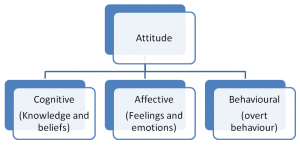Attitudes: Do I have one? no comments
I have found myself in a rather strange territory this week. Under normal circumstances, I would be very offended or at least somewhat disappointed with myself if someone says I have an attitude. Yet, what does the word “attitude” actually means?
“attitudes are defined at least implicitly as responses that locate ‘objects of thought’ on ‘dimensions of judgement’ ” (McGuire, 1985, p.239)
“an attitude is a general and enduring positive or negative feeling about some person, object or issue” (Petty and Cacipoppo, 1996, p.7)
It is interesting to see from this definition that we all have an attitude toward something. It is normal. Most importantly, having an attitude in an academic sense is not wrong. An attitude can be positive or negative. Even negative attitude is not always wrong. For example, having a negative attitude toward murder is generally socially acceptable. This concept of right and wrong, or social acceptance brings us to another closely related topic: Cognition and Behavioural relationship.
Cognition and Behavioural Relationship
The above model is commonly known as the ABC model for obvious reason. This model was first proposed by Hilgard in 1980 and has since became the fundamental framework for further research. For instance, many have investigated the relationship between behaviour and beliefs. It has been found that behaviours are modified by the peers, identity of self with the peers and perceived social norms.
This is an interesting findings because it backs up the social concept of “peer pressure” and shed light on how these pressures function/ affect an individual. The book then went on to discussion several theories regarding the factors involved, such as: theory of reasoned action, and planned behaviour, social identity, self-categorisation, social norms, group definition and discursive theories.
Time would fail me if I was to detail all of them here. It should be sufficient to say that these theories were used to describe the results obtained from various experiments. It is particularly interesting to see how these theories interact with each other and compliments each other.
Moving On
In view of the time remaining, I will be reading up more on self and identity as I have found this topic rather interesting. That will then be my last post based on text book reading. Further posts will concentrate on multidisciplinary approach and migrate towards final report style thinking/ writing/ blogging.
